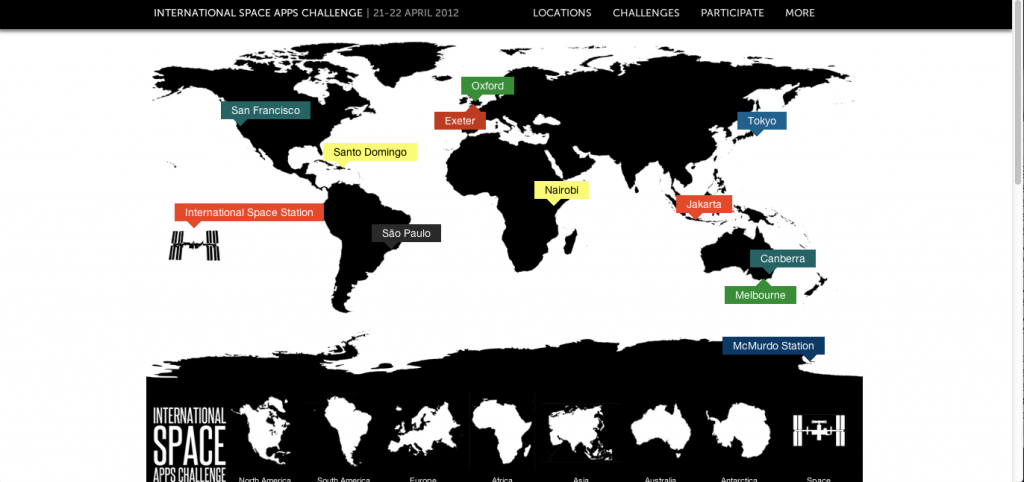International Space Apps Challenge, 21-22 april 2012
On April 21-22, 2012, the International Space Apps Challenge, the spaceappschallenge.org, will be held in the Hackathon format for 2 days, when participants around the world will solve the problems proposed by them.
The main organizer and sponsor of the competition is NASA, the competition is held within the framework of voluntary commitments of the United States under the Open Government Partnership.

')
The competition is quite popular in the US format - first collect all the wishes and then combine the teams to solve them.
And now they are gathering spaceappschallenge.org/submit ideas on 4 themes - Software, Open Hardware, Citizen Science and Data Visualization. On all topics there are already tasks and you can also send your own. And all posted topics can be viewed here spaceappschallenge.org/challenges
And the competition itself will be held in the following places:
- USA, San Francisco
- Dominican Republic, Santo Domingo
- Kenya, Nairobi
- Australia - Melbourne and Canberra
- Indonesia, Jakarta
- Japan Tokyo
- UK, Oxford and Exeter
- Brazil, Sao Paulo
- Antarctic, McMurdo Station
And now closer to our Russian realities. Is it possible to take in this jumping? In Russia there is no. We'll have to go to one of the places where it will be held, if at all set such a goal. What benefits can be gained?
1. Offer your ideas for a solution, perhaps they will be accepted and participants will be able to implement.
2. To observe how such tasks are solved at the global level, that citizens and states are on the agenda.
For example, you can note that most of the tasks associated with open data that NASA disclosed all these years.
Is it possible to hold such a competition in Russia, alas, no. Roscosmos hopelessly lagged behind in publicity and openness. We have not only open data, but also an understanding of how they should be provided and why. You will have to start from scratch and the path will be long.
The maximum possible is that Russian developers could take part in such a competition, but even this would require efforts from Roskosmos or the Russian Foreign Ministry.
Therefore, alas, the situation is disappointing, but we can still benefit from it, although in the form of the results of what the participants do.
The main organizer and sponsor of the competition is NASA, the competition is held within the framework of voluntary commitments of the United States under the Open Government Partnership.

')
The competition is quite popular in the US format - first collect all the wishes and then combine the teams to solve them.
And now they are gathering spaceappschallenge.org/submit ideas on 4 themes - Software, Open Hardware, Citizen Science and Data Visualization. On all topics there are already tasks and you can also send your own. And all posted topics can be viewed here spaceappschallenge.org/challenges
And the competition itself will be held in the following places:
- USA, San Francisco
- Dominican Republic, Santo Domingo
- Kenya, Nairobi
- Australia - Melbourne and Canberra
- Indonesia, Jakarta
- Japan Tokyo
- UK, Oxford and Exeter
- Brazil, Sao Paulo
- Antarctic, McMurdo Station
And now closer to our Russian realities. Is it possible to take in this jumping? In Russia there is no. We'll have to go to one of the places where it will be held, if at all set such a goal. What benefits can be gained?
1. Offer your ideas for a solution, perhaps they will be accepted and participants will be able to implement.
2. To observe how such tasks are solved at the global level, that citizens and states are on the agenda.
For example, you can note that most of the tasks associated with open data that NASA disclosed all these years.
Is it possible to hold such a competition in Russia, alas, no. Roscosmos hopelessly lagged behind in publicity and openness. We have not only open data, but also an understanding of how they should be provided and why. You will have to start from scratch and the path will be long.
The maximum possible is that Russian developers could take part in such a competition, but even this would require efforts from Roskosmos or the Russian Foreign Ministry.
Therefore, alas, the situation is disappointing, but we can still benefit from it, although in the form of the results of what the participants do.
Source: https://habr.com/ru/post/139687/
All Articles